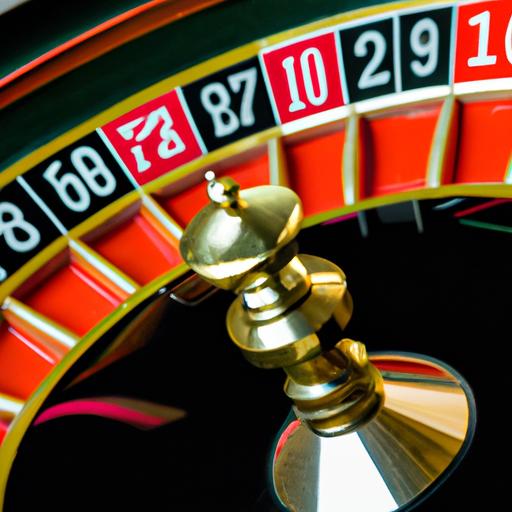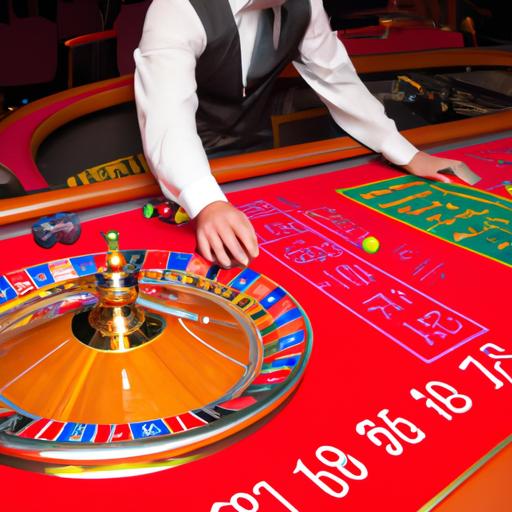What Are the Odds in Roulette: A Comprehensive Guide
Roulette is a popular casino game that has been around for centuries. It’s a game of chance that involves a spinning wheel with numbered pockets, a small ball, and a betting table. The objective is to predict where the ball will land on the wheel. The excitement and thrill of the game have made it a favorite among gamblers worldwide.
However, before you dive into the game, it’s essential to understand the odds in roulette. In this comprehensive guide, we’ll take a closer look at the odds and various types of bets in roulette. We’ll also examine the concept of the house edge and the impact it has on the odds. Additionally, we’ll explore strategies that you can use to improve your odds of winning and debunk some common misconceptions about roulette odds. So, let’s get started!
Understanding the Basics of Roulette Odds

Roulette odds can be tricky to understand, but once you break them down, they’re relatively simple. Understanding the various types of bets in roulette is critical to improving your chances of winning.
Explanation of the various types of bets in roulette
There are two main types of bets in roulette: inside bets and outside bets. Inside bets are placed directly on the numbers on the table and have higher payouts but lower odds of winning. Outside bets are placed on the outside of the table and cover multiple numbers. These bets have lower payouts but higher odds of winning.
The difference between inside and outside bets
Inside bets include straight bets, split bets, street bets, corner bets, and five-number bets. Straight bets are placed on a single number, while split bets are placed on two adjacent numbers. Street bets are placed on three numbers in a row, while corner bets are placed on four numbers that form a square. Five-number bets are only available in American roulette and involve betting on the numbers 0, 00, 1, 2, and 3.
Outside bets include red/black bets, even/odd bets, high/low bets, column bets, and dozen bets. Red/black bets are placed on either all the red numbers or all the black numbers. Even/odd bets are placed on either all the even numbers or all the odd numbers. High/low bets are placed on either all the high numbers (19-36) or all the low numbers (1-18). Column bets cover an entire column of numbers, while dozen bets cover one of three groups of 12 numbers.
The role of the roulette wheel and the numbers on it
The roulette wheel is the centerpiece of the game. It consists of 38 numbered pockets in American roulette and 37 numbered pockets in European roulette. The numbers on the wheel range from 1 to 36, with an additional 0 (and 00 in American roulette). The numbers are arranged in a specific pattern on the wheel to ensure randomness and fairness. Understanding the layout of the wheel and the numbers on it is essential to making strategic bets in roulette.
The House Edge and Payouts

When playing roulette, it’s crucial to understand the concept of the house edge. The house edge is the advantage that the casino has over players and is represented as a percentage. In roulette, the house edge varies depending on the type of bet you place.
The Concept of the House Edge and Its Impact on the Odds
The house edge in roulette is determined by the number of pockets on the wheel. The American roulette wheel has 38 pockets, while the European roulette wheel has 37 pockets. This difference is due to the additional double zero pocket on the American wheel. The presence of the extra pocket increases the house edge significantly.
The house edge in American roulette is 5.26%, while the house edge in European roulette is 2.70%. This means that for every $100 you bet, you can expect to lose $5.26 in American roulette and $2.70 in European roulette. This difference may seem small, but over time, it can add up to significant losses.
The Relationship Between the House Edge and Payouts
The house edge and payouts are inversely related. The higher the house edge, the lower the payout, and vice versa. For example, a straight-up bet in roulette has a payout of 35:1, meaning that if you bet $1 and win, you will receive $35. However, the odds of winning a straight-up bet are 1 in 38 in American roulette and 1 in 37 in European roulette. This means that the house edge for a straight-up bet is 5.26% in American roulette and 2.70% in European roulette.
Detailed Examples of the Payouts for Different Types of Bets
There are several types of bets in roulette, each with its payout and odds of winning. Here are some examples:
- Straight-up bet: A bet on a single number. Payout is 35:1, and the odds of winning are 1 in 38 in American roulette and 1 in 37 in European roulette.
- Split bet: A bet on two adjacent numbers. Payout is 17:1, and the odds of winning are 2 in 38 in American roulette and 2 in 37 in European roulette.
- Street bet: A bet on three numbers in a row. Payout is 11:1, and the odds of winning are 3 in 38 in American roulette and 3 in 37 in European roulette.
- Corner bet: A bet on four numbers that form a square. Payout is 8:1, and the odds of winning are 4 in 38 in American roulette and 4 in 37 in European roulette.
Understanding the house edge and payouts in roulette is critical to making informed betting decisions. In the next section, we’ll explore strategies that you can use to improve your odds of winning.
Strategies for Improving Odds in Roulette
Roulette is a game of chance, but that doesn’t mean you can’t improve your odds of winning. There are various strategies that you can use to increase your chances of success. In this section, we’ll provide an overview of some of the most popular strategies and analyze their effectiveness.
Overview of Various Strategies
-
Martingale System: This strategy involves doubling your bet after each loss, with the aim of recouping your losses and making a profit when you win.
-
Reverse Martingale: Also known as the Paroli system, this strategy involves doubling your bet after each win, with the aim of maximizing your winnings.
-
D’Alembert System: This strategy involves increasing your bet by one unit after each loss and decreasing it by one unit after each win.
-
Fibonacci System: This strategy involves betting according to the Fibonacci sequence, with the aim of recouping your losses and making a profit when you win.
Analysis of the Effectiveness of Each Strategy
It’s important to note that no strategy can guarantee a win in roulette. Each strategy has its pros and cons, and the effectiveness depends on various factors, such as the type of bet, the size of the bankroll, and the player’s risk appetite.
The Martingale system is one of the most popular but has a high risk of losing a significant amount of money quickly. The Reverse Martingale system is less risky but also less profitable. The D’Alembert system is a moderate-risk strategy but may take longer to see a return. The Fibonacci system is a low-risk strategy but requires a large bankroll to be effective.
Tips for Implementing Strategies in a Real Game
When implementing any strategy in roulette, it’s important to have a clear understanding of the rules and the odds. Start with small bets to test the waters and increase your bets gradually. Avoid chasing losses or getting too greedy. Set a budget and stick to it, and don’t be afraid to walk away if you’re not having any luck. Remember, the key to success in roulette is to have fun and enjoy the game!
Common Misconceptions About Roulette Odds
Roulette is a game of chance, and like any other game of chance, it’s easy for myths and misconceptions to develop. Unfortunately, these myths and misconceptions can lead to players making poor decisions and losing money. In this section, we’ll take a closer look at some of the most common misconceptions about roulette odds.
Debunking Common Myths and Misconceptions About Roulette Odds
One of the most common misconceptions about roulette is that the previous outcomes affect future outcomes. For example, some players believe that if the ball has landed on black several times in a row, then red is due to come up soon. This belief is entirely false. Each spin of the wheel is independent, and the previous outcomes have no impact on future outcomes.
Another common misconception is that certain betting systems can guarantee a win. Unfortunately, there is no betting system that can guarantee a win. The house edge ensures that the odds are always in favor of the casino in the long run.
Explanation of Why Certain Beliefs are Incorrect
It’s important to understand why certain beliefs are incorrect because they can lead to players making poor decisions. For example, if a player believes that the previous outcomes affect future outcomes, they may continue to bet on red after black has come up several times in a row. This can lead to significant losses.
Likewise, if a player believes that a certain betting system can guarantee a win, they may continue to use that system even after experiencing losses. This can also lead to significant losses.
Advice on Avoiding Common Pitfalls
To avoid common pitfalls, it’s essential to understand the odds and the concept of the house edge. It’s also important to set a budget and stick to it. Don’t chase losses, and don’t let emotions cloud your judgment.
Furthermore, it’s important to avoid betting systems that claim to guarantee a win. Instead, focus on understanding the odds and making informed decisions based on that understanding. By avoiding common pitfalls, you can enjoy roulette without losing too much money.
Conclusion
In conclusion, understanding the odds in roulette is crucial if you want to increase your chances of winning. By knowing the various types of bets, their payouts, and the house edge, you can make informed decisions when placing your bets. Additionally, implementing effective strategies can further improve your odds of winning.
Remember, roulette is ultimately a game of chance, and there’s no foolproof way to guarantee a win. However, by following the tips outlined in this guide, you can increase your chances of success and make the most out of your roulette experience.
So, the next time you’re at a casino or playing online, keep in mind the odds in roulette and use your newfound knowledge to your advantage. Who knows, you may just hit the jackpot!